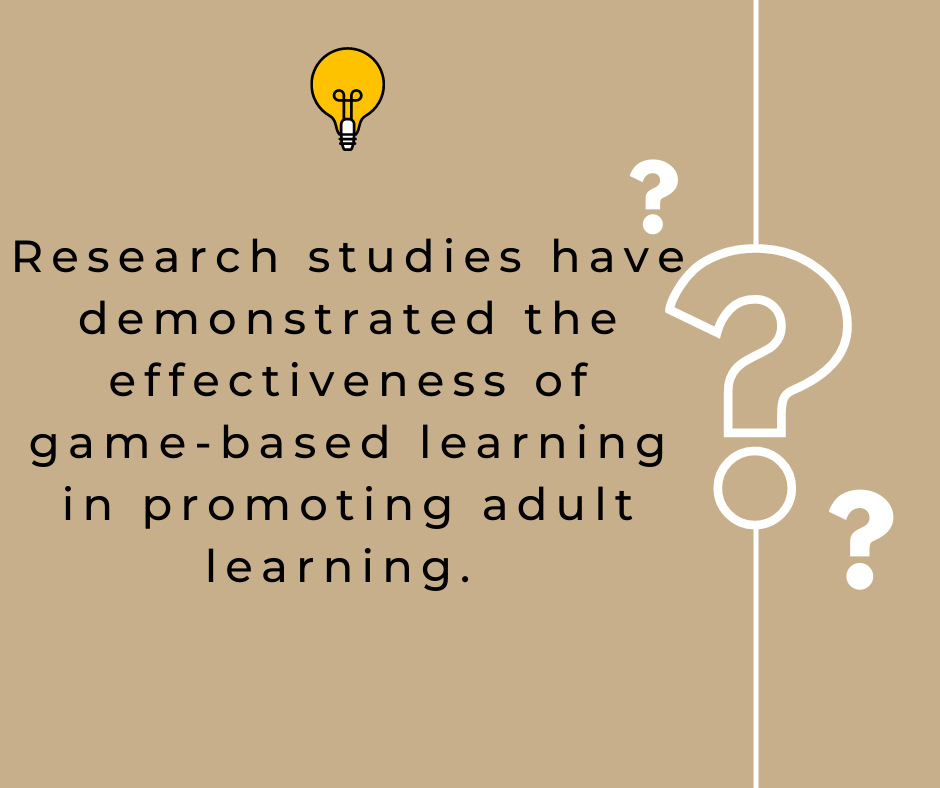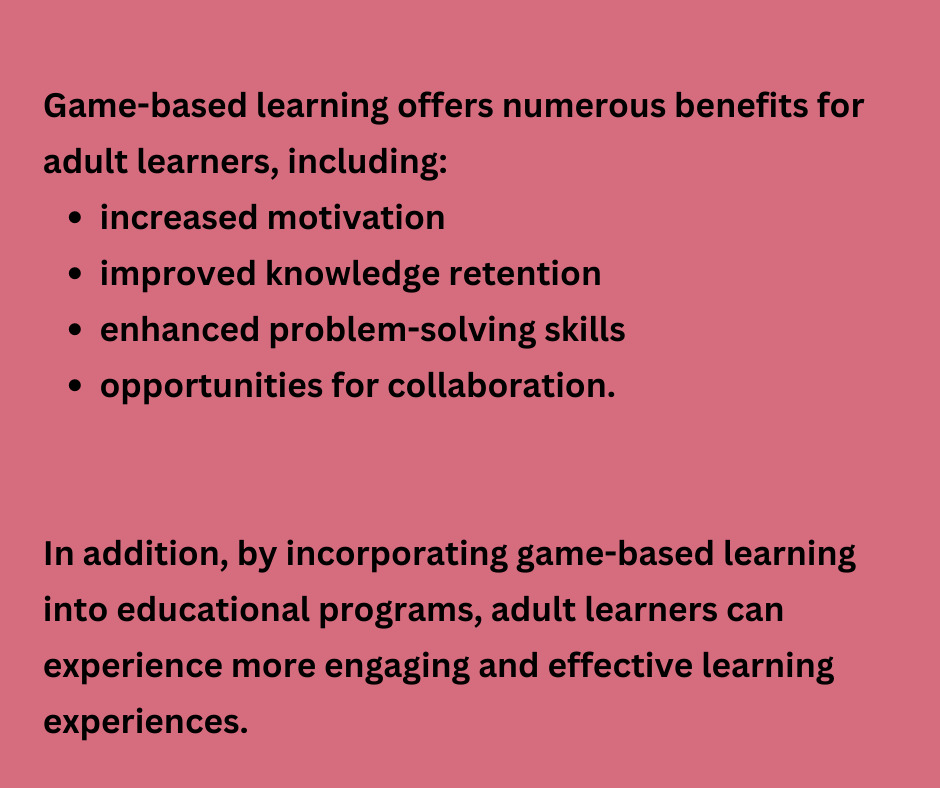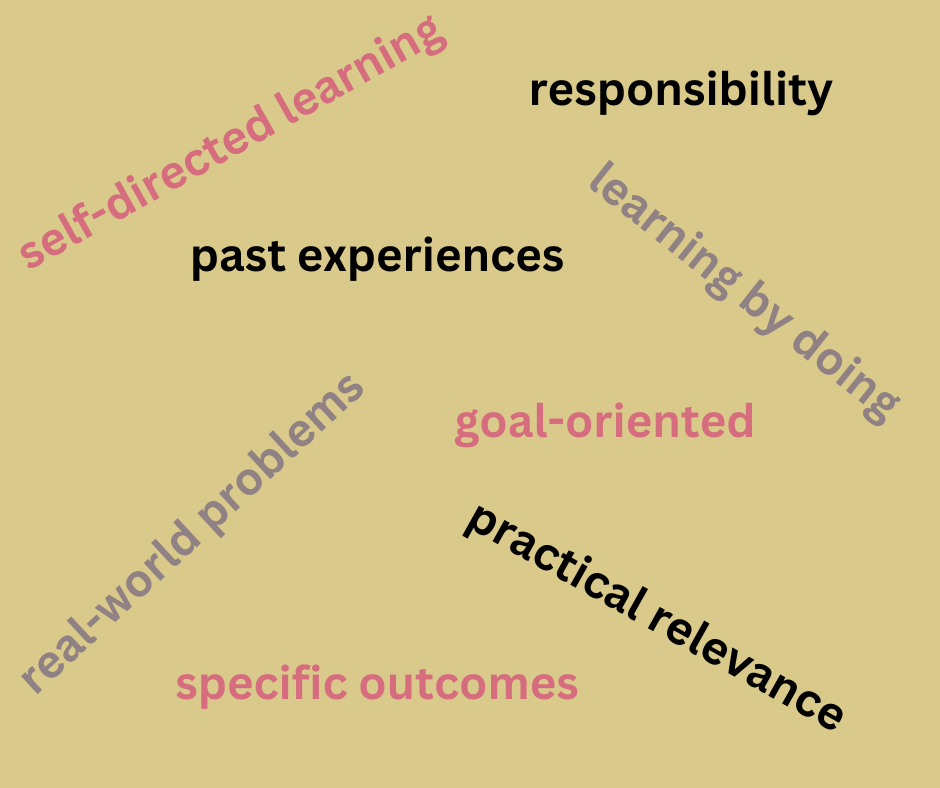Game-Based Learning

In a rapidly changing world, continuous learning and skill development have become paramount for adults seeking personal growth and professional success. While still valuable, traditional educational approaches may not always cater to adult learners' unique needs and motivations. Enter game-based learning, an innovative educational approach combining gaming elements with learning to create immersive, engaging, and effective experiences. In this article, we will explore the benefits of game-based learning for adult learners, explore how it supports various adult learning strategies, and examine real-life examples of gamification in adult education. Finally, discover how game-based learning can transform the way adults learn, unlocking their full potential and preparing them for the challenges of today's dynamic world.
In this article
Theory Behind Game-Based Learning
Game-based learning is an educational approach that integrates gaming elements, such as competition, scoring, and storytelling, into the learning process. It aims to engage learners, improve knowledge retention, and enhance motivation. Game-based learning has its roots in the constructivist theory of learning, which emphasises the active role of the learner in constructing their knowledge through interactions with the environment.
Over the past few decades, game-based learning has evolved and gained traction with the advent of new technologies, such as virtual reality (VR), augmented reality (AR), and mobile applications. These advancements have expanded game-based learning applications across various fields, including healthcare, business, military, and education.

Some systematic literature reviews (1, 2) found that computer-based simulation games improved self-efficacy, knowledge retention, skill-based knowledge, and cognitive learning outcomes.
Also, serious games have the potential to improve medical education and surgical skills training, with the added benefits of increased learner motivation and engagement (3).
These studies, among others, highlight the potential of game-based learning in enhancing adult learning outcomes. By incorporating elements of competition, storytelling, and interactivity, game-based learning can create immersive and engaging educational experiences, supporting the idea that this approach positively impacts teaching and learning for adults.
Benefits of Game-Based Learning
Game-based learning offers several benefits, making it an effective educational approach for all learners. Some of these benefits include:
1. Increased motivation and engagement
Game-based learning stimulates curiosity and interest by incorporating elements such as competition, rewards, and storytelling. This helps to keep adult learners motivated and engaged, leading to better learning outcomes.
2. Improved knowledge retention
Interactive learning experiences provided by games can help to deepen understanding and improve retention of information. When learners actively participate and apply their knowledge in a game-based learning environment, they are more likely to remember the concepts and skills.
3. Enhanced problem-solving skills
Many games involve solving complex problems, strategising, and making decisions under pressure. Game-based learning can help adult learners develop valuable critical thinking and problem-solving skills in various professional and personal situations.
4. Collaboration and teamwork
Multiplayer games and cooperative game-based learning scenarios encourage collaboration and teamwork. Adult learners can develop interpersonal skills, communication, and collaboration by working together to achieve common goals within the game.
5. Immediate feedback
Games often provide immediate feedback on performance, allowing learners to understand their mistakes, learn from them, and adjust their strategies accordingly. This real-time feedback helps adult learners to progress and improve rapidly.
6. Safe learning environment
Game-based learning offers a risk-free environment for adult learners to experiment, make mistakes, and learn from them without real-world consequences. This encourages learners to take risks and try new strategies, leading to a deeper understanding of the subject matter.
7. Customised learning experience
Game-based learning often allows learners to progress at their own pace and offers adaptive learning paths based on individual performance. This personalised approach caters to the unique needs and learning styles of adult learners.
8. Relevance to real-world scenarios
Many game-based learning applications are designed to simulate real-world situations, enabling adult learners to apply their knowledge and skills to practical contexts. This helps to bridge the gap between theoretical knowledge and real-life application.

Examples of Game-Based in Different Domains
Gamification in adult education has been applied across various fields and settings to improve learning experiences and outcomes. Here are some examples:
- Language Learning: Duolingo is a popular language learning app that uses gamification elements, such as points, levels, and badges, to motivate users. Adult learners can compete with friends, unlock new content as they progress, and maintain learning streaks to keep them engaged and motivated.
- Professional Development: Salesforce Trailhead is an online learning platform that helps users develop skills related to Salesforce products and services. Trailhead utilises gamification by offering badges, points, and leaderboards to encourage learners to complete modules, earn ranks, and showcase their skills.
- Corporate Training: Companies like McDonald's and KFC have employed gamification in their employee training programs. For example, McDonald's created a game called "McDonald's Videogame" that simulates running a fast-food franchise, teaching employees about supply chain management, marketing, and other business aspects.
- Healthcare Education: The Re-Mission series of games developed by HopeLab helps cancer patients, including adults, learn about their treatment and adopt healthy behaviours. These games use engaging narratives and interactive elements to educate patients and improve treatment adherence.
- Financial Literacy: Apps like Mint and Bankaroo use gamification elements to teach adults about personal finance, budgeting, and saving. Users can set goals, earn rewards, and track progress, making financial education more engaging and accessible.
These examples showcase the versatility of gamification in adult education across various domains, emphasising its potential to create engaging, motivating, and effective learning experiences for adult learners.
Merging Adult Learning Approaches with Game-Based Learning
Adult learning strategies often differ from those employed by children or adolescents, as they account for the unique experiences, motivations, and goals of adult learners. Here is how game-based learning is aligned with some characteristics of adult learners:
- Self-directed learning: Adult learners tend to take more responsibility for their learning process, setting goals and choosing the resources and methods that best suit their needs. Game-based learning supports self-directed learning by offering adaptive and customisable learning experiences, allowing learners to progress at their own pace and focus on the areas where they need the most improvement.
- Experiential learning: Adults usually learn best by doing and relating new information to their past experiences. Game-based learning provides immersive, interactive environments where learners can apply their knowledge and skills in practical contexts, which enhances the learning process.
- Problem-based learning: Adult learners often prefer to learn by solving real-world problems that are relevant to their personal or professional lives. Many games are designed around complex problem-solving scenarios, enabling learners to develop their critical thinking and problem-solving skills while working through engaging challenges.

- Collaborative learning: Adult learners can benefit from working with others, sharing knowledge, and learning from diverse perspectives. Multiplayer games and cooperative game-based learning scenarios promote collaboration, communication, and teamwork, fostering a sense of community among learners.
- Goal-oriented learning: Adults tend to be more goal-oriented in their learning pursuits, focusing on specific outcomes or objectives. Game-based learning often incorporates clear goals and objectives, which can help learners stay focused and motivated throughout the learning process.
- Relevance to real-world scenarios: Adult learners are more likely to engage with learning materials that are applicable to their personal or professional lives. Game-based learning can simulate real-world situations and challenges, helping learners see the practical relevance of the skills and knowledge they acquire.
In summary, game-based learning supports various adult learning strategies by offering self-directed, experiential, problem-based, and collaborative learning experiences. Furthermore, by incorporating immediate feedback, clear goals, and real-world relevance, game-based learning can effectively engage and motivate adult learners, leading to better learning outcomes.
Conclusion
Game-based learning has emerged as a powerful tool in adult education, offering a range of benefits that cater to the unique needs of adult learners. By incorporating elements of competition, collaboration, storytelling, and interactivity, this educational approach can create immersive and engaging learning experiences that improve knowledge retention, enhance problem-solving skills, and increase motivation.
Key Takeaways:
- Game-based learning can increase motivation and engagement among adult learners, leading to better learning outcomes.
- Interactive learning experiences provided by games can improve knowledge retention and deepen understanding.
- Game-based learning promotes the development of problem-solving skills, collaboration, and teamwork.
- Gamification has been successfully applied across various fields, including language learning, professional development, healthcare education, and financial literacy.
Embracing game-based learning in adult education can lead to more meaningful and impactful learning experiences, helping individuals stay competitive and adaptive in an ever-evolving world.
Suggested reading on the topic:
(1) Sitzmann, T. (2011). A meta-analytic examination of the instructional effectiveness of computer-based simulation games. Personnel Psychology (64). pp. 489 - 528. 10.1111/j.1744-6570.2011.01190.x.
(2) Boyle, E., et.al. (2016). An update to the systematic literature review of empirical evidence of the impacts and outcomes of computer games and serious games. Computers & Education (94), pp. 178-192.
(3) Graafland, M., Schraagen, J. M., & Schijven, M. P. (2012). Systematic review of serious games for medical education and surgical skills training. The British journal of surgery, 99(10), 1322–1330. https://doi.org/10.1002/bjs.8819